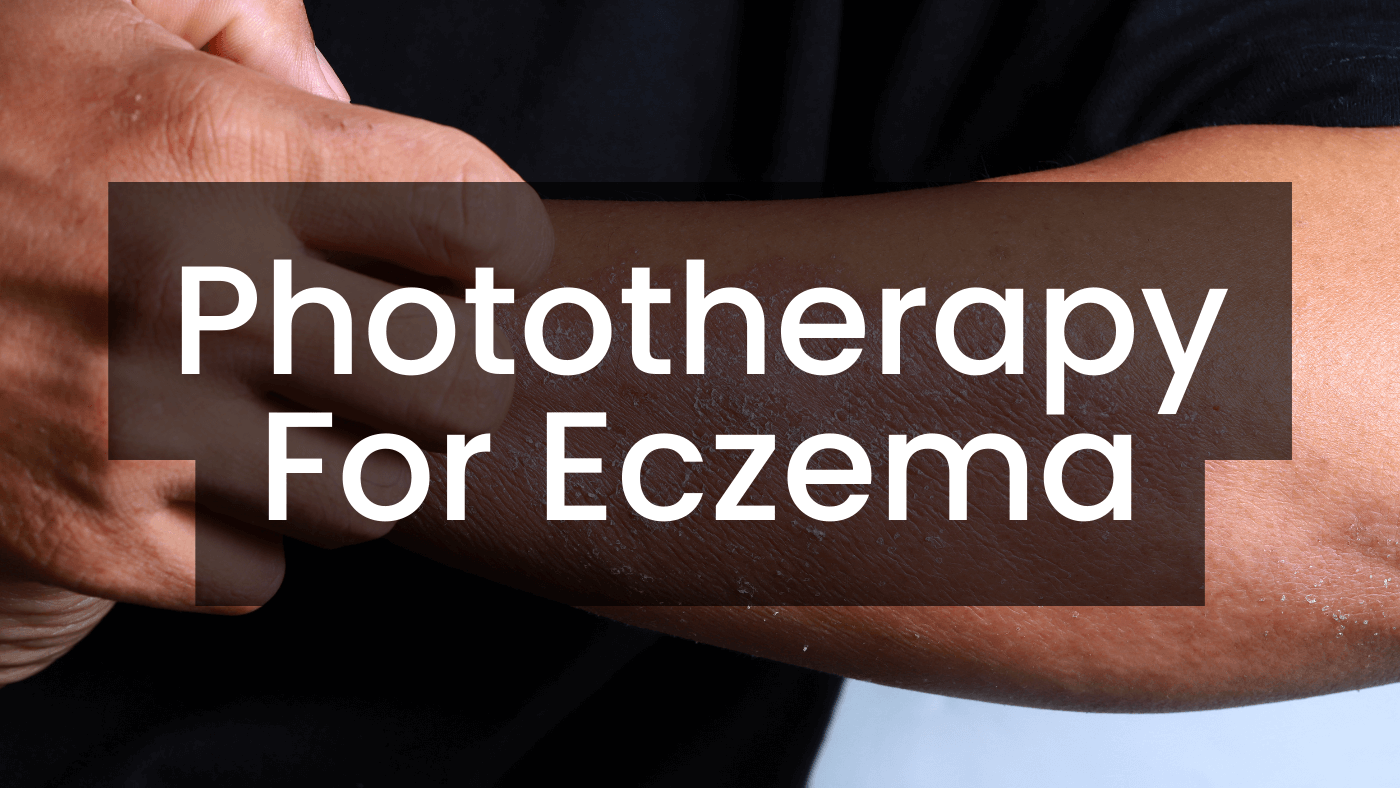Phototherapy for Eczema

Eczema (atopic dermatitis) is an inflammatory skin condition that is thought to be caused by an overactive immune system. Eczema is non-contagious and causes itchy, red and sore skin. Eczema is believed to affect 1 in 5 children and 1 in 10 adults in the UK, according to the National Eczema Society (1). Treatment for eczema may include trigger management, lifestyle changes, medication and phototherapy.
What is phototherapy?
Phototherapy is a UV light therapy treatment for various skin conditions like eczema, vitiligo, dermatitis and psoriasis. There are two different types of Ultraviolet (UV) light waves - UVA and UVB. Narrow-band UVB that uses a small part of the UVB spectrum is particularly interesting for treating skin conditions as it is considered safer than UVA phototherapy in long-term use.
Phototherapy is used as a treatment in hospitals or doctors' offices. But did you know that phototherapy can also be done at home using portable phototherapy units?
What is eczema?
Eczema is also known as atopic eczema or atopic dermatitis. Eczema is a condition in which the skin becomes dry, itchy and cracked. Some people with eczema have patches across their whole body and suffer full-body inflammation, whereas others experience only small patches of dry skin.
Eczema appears to impact more children than adults, with 20% of children presenting with eczema at some time in their childhood (1). Most people with eczema present with periods of more severe eczema, known as flare-ups, followed by periods with less noticeable symptoms.
There is no one cause of eczema, but interestingly, eczema often occurs in people with allergies and often presents alongside asthma and hay fever.
People with eczema may be aware of specific triggers that can set off a flare-up, including stress, cold weather, certain body soaps, and laundry detergents.
Treatment of eczema may be topical via emollients to help with dry skin or corticosteroids to reduce redness, itching, swelling and inflammation during a flare-up. Treatment may also involve stress management techniques and lifestyle changes such as avoiding triggers and reducing scratching of sore spots when possible.
Phototherapy may also be used for the treatment of eczema, as well as other skin conditions like psoriasis and dermatitis.
Can eczema be treated with phototherapy?
Phototherapy does appear to be effective in treating eczema and is generally used in clinical settings as a second-line treatment. First-line treatments include steroid and anti-histamine topical and oral medication.
People may try phototherapy if first-line treatments do not work or prefer not to take medication.
UVB light therapy is a safer alternative to UVA light therapy as these rays do not penetrate the skin as deeply. Light therapy works by exposing the skin to doses of UV light. It is believed that UV light can help with eczema treatment due to its immunosuppressive effect on the skin. This means it may reduce an overactive immune response in the skin.
A recent study of 844 patients with eczema found that using narrow-band UVB phototherapy as a treatment for eczema can improve symptoms of eczema. Researchers also found that phototherapy treatment reduced the need for other medical treatments like oral corticosteroids and antihistamines (2).
Can I treat eczema with phototherapy at home?
Home UVB phototherapy is an alternative option to outpatient UVB phototherapy treatment for people with eczema.
Although more evidence is needed, researchers believe that at-home options for treating eczema using phototherapy will result in similar outcomes to those of in-office use (3).
You can purchase portable phototherapy lamps for at-home use, which use the same bulbs as outpatient lamps.
At Care Lamps, we offer a Derma UVB Narrowband Phototherapy Lamp for use at home for people with eczema, which is medically certified and comes with full setup and treatment instructions.
How long does it take for phototherapy to work on eczema?
The length of the phototherapy treatment needed for eczema will depend on the individual and various factors. This may include the severity of eczema, skin type, and sensitivity.
In the research, people tend to undergo two to three sessions per week for between two to three months to clear a flare-up. But results may be seen more quickly in specific individuals (4).
For people with eczema, if phototherapy clears up the area, you may still want to regularly carry out UVB phototherapy to minimise the likelihood of another flare-up.






Leave a comment